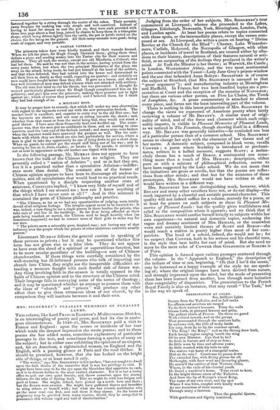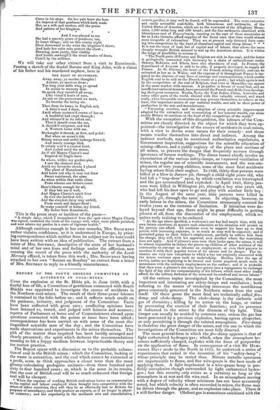MRS. SIGOURNEY'S PLEASANT MEMORIES OF PLEASANT LANDS.
Tins volume, like Lord FRANCIS EGERTON'S Mediterranean Sketches, is an intermingling of poetry and prose, and had its rise in analo- gous circumstances. In 1840-41, Mrs. SIGOURNEY paid a visit to France and England : upon the scenes or incidents of her tour which made the deepest impression she wrote poems ; and to these poems she has added notes, sometimes explanatory of particular passages in the text, and sometimes forming a species of essay on the subject ; but in either case exhibiting the opinions of an elegant, and, for an American, a rightminded woman, on England and the English, with a passing glance at Paris and the road thither. It should be premised, however, that she has looked on the bright side of things, or at least noted it only. "The writer," says Mrs. SIGOURNEY in her preface, "has not sought to dwell upon the dark shades of the countries that it was her privilege to visit. It might have been easy to fix the eye open the blemishes that appertain to each, as it is to discern foibles in the most exalted character. Yet it is but a losing office to quit our own quiet fireside, and throw ourselves upon the stormy billows, for the sake of finding fault. This we might do with less fatigue and peril at home. She might, indeed, have picked up a nettle here and there ; but the flowers were sweeter. She might have gathered thorns and brambles to sting others or herself with ; but ohat she has missed, multitudes who go the same road can find, and cull them if they choose. So the lovers of poignancy may be gratified from many sources, sheuld they be compelled to pronounce this volume vapid and void of discrimination." Judging from the order of her subjects, Mrs. SIGOURNEfS tour commenced at Liverpool; whence she proceeded to the Lakes,
Glasgow, Edinburgh, Newcastle, York, Birmingham, London, Farb, and London again. At least her poems relate to topics connected with these spots or the intermediate places, except the verses com- posed at sea. At Liverpool, she writes a poem on hearing "Divine Service at the Church for the Blind" : Chester, Lake Winander- mere, Carlisle, Holyrood, the Necropolis of Glasgow, with other places, or incidents of travel in Scotland, are treated either by allu- sions to their history, descriptions of their features natural or arti- ficial, or an outpouring of the feelings they produced in the writer's mind. At York the Minster is her theme ; at Warwick, the Castle ; in London, Westminster Abbey, and the two most sentimental points connected with the Tower—Lady Jane Grey's prison-window
and the axe that beheaded Anne Boleyn: SHAKSPERE is of course the subject at Stratford, (but Mrs. SIGOURNEY is unequal to that "great argument"); and manufacturing industry at Birmingham
and Sheffield. In France, her two best-handled topics are a pre- sentation at Court and the reception of the remains of NAPOLEON; but there are various other poems, on Pere La Chaise, the Tomb of Josephine, &c. A prose commentary is attached to almost every piece, and forms not the least interesting part of the volume.
There is nothing in this latest production of Mrs. SIGOURNEY to change the views we expressed of American poetry when lately reviewing a volume of Mr. BRYANT'S. A similar want of origi-
nality of mind, and of the force and character which such origi- nality imparts, is visible in Pleasant Memories of Pleasant Lands, as we noticed in The Fountain, though showing itself in a different
way. Mr. BRYANT was generally imitative—he reminded one less of a particular person than of a common school. Mrs. StoouaNEr
seems to change her style with the character of her theme and of her metre. A domestic subject, composed in blank verse, recalls CowrEtt ; a poem where feudality is introduced or predomi- nates, written in a ballad measure, suggests SCOTT; a melan-
choly theme has a touch of BYRON, a sentimental one some- thing more than a touch of Mrs. HEMANS ; description, either
pure or with a mixture of philosophical reflection, seems to have been suggested by the Lake school. We do not mean that the imitations are gross or servile, but that the poems are reflec-
tions from other minds ; and that but for the existence of these prototypes, Mrs. SIGOURNEY would not have written at all, or would have written in a different way.
Mrs. SIGOURNEY has one distinguishing mark, however, which BRYANT and many other versifiers have not, or do not display—the mark imparted by a cheerful and amiable personal character. This quality will not indeed suffice for a volume, scarcely for a poem or at least for poems on such subjects as those in Pleasant e -
mories of Pleasant Lands : but the quality gives truthfulness and relief to the composition where it appears • and we think that if
Mrs. SIGOURNEY would confine herself strictly to subjects within her own experience—to natural and domestic topics, eschewing the vague and dreamy sentiment of Mrs. HEMANS, or the somewhat worn and certainly limited themes of SCOTT and BYRON—she
would reach a station in poetry higher than most of her com- patriots. The head of a school, indeed, she would not be ; for
we suspect that COWPER, both in his serious and his cheerful tone, is the style that best befits her cast of mind. But she need no more be the mere echo of COWPER than GOLDSMITH or Rooms is of POPE.
This opinion is formed upon various passages scattered through the volume. In the " Approach to England," the description of the tedium of time at sea, beginning, "Oh that I lov'd the ocean," may be instanced as a happy example of the style we are speak- ing of; where the original images have been derived from nature, and strongly impressed upon the mind, but the mode of' presenting them has been learned from another, less through mere imitation than congeniality of disposition. The presentation to the French Royal Family is also an instance, that may recall " The Task," but in the way we speak of.
PRESENTATION AT COURT.
See, brilliant lights Stream from the Tuileries, and in full ranks Its officers and servitors are ranged To do their nation's honours. From the walls Gleam forth, in pictured bravery and pride, The gallant chiefs of France. On those we gazed With critical remark, and on the groups That promenaded through the spacious halls, In costume rich, the elite of many lands. Ere long, from lip to lip the murmur spread, "The King ! the King!" and so the throng drew back, Each foreign region ranging 'neath the wing Of its own Minister. Can that be he ?
So fresh in feature and of step so firm ; So little worn by time and adverse years; So little wearied with his toils to rule The restive war-horse of a changeful realm, Mad on the rein ? Courteous he passes down The extended line, with fitting phrase for all. Methought, with freer word and favouring glance,
Ile scann'd the natives of that Western clime,
'Where, in the exile of his clouded youth, He found a wanderer's home. 'Twos sweet to hear, In the bright throne-room of the Tuileries, And from the lip of Europe's wisest King, The name of my own river, and the spot Where I was born, coupled with kindly words As one tenacious of their scenery Through many a lustrum.
Then the graceful Queen,
With gentleness and dignity combined, Came in his steps. On her pale brow she bore An impress of that goodness which hath made Her, as a wife and mother, still the praise And pattern of her kingdom. • S •
And I was pleased to see She had a queenly grace of prudence, too, In lesser things; and on this wintry night Drew downward to the wrist the lengthen'd sleeve, And bade her satin robe protect the chest ; Deeming, most justly, that vitality And health outweigh'd the tinsel modes of dress, Coin'd by the milliner.
We will take our other extract from a visit to Runnimede. Passing a sketch of the feudal Barons and King John, with a vision of his father and his murdered nephew, here is
THE DAISY OF RUNNIMEDE.
Away, away, ye sombre thoughts!
Avaunt, ye spectres drear ; Too long your sable wing ye spread In scenes to memory dear.
So quick they vanish'd all away, Like visiou'd hosts of care, As out on the greensward we went, To breathe the balmy air.
Then from its home, in English soil, A daisy's root I drew, Amid whose moisten'd crown of leaves A healthful bud crept through ; And whisper'd in its infant ear, That it should cross the sea, A cherish'd emigrant, and find A Western borne with me.
Methought it shrank, at first, and paled; But when on ocean's tide Strong waves and awful icebergs frown'd, And manly courage died, It calmly rear'd a crested head, And smiled amid the storm, As if old Magna Charta's soul Inspired its fragile form.
So where, within my garden-plat, I sow the choicest seed, Amid my favourite shrubs I placed The plant of Runnimede, And know not why it may not draw Sweet nutriment, the same As when within that noble clime From whence our fathers came.
Here's liberty enough for all,
If they but use it well, And Magna Charta's spirit lives In e'en the lowliest cell; And the simplest daisy may unfold, From scorn and danger freed :
So make yourself at home, my friend,
My flower from Runnimede.
This is the prose story or incident of the poem— "A simple daisy, which I transplanted from the spot where Magna Charts, was signed, sustained the trials of the voyage well, when rarer plants perished, and now adorns my garden in a state of vigorous health."
Although cautious enough in her own remarks, Mrs. SIGOURNEY rather violates confidence, as it is understood in Europe, by print- ing correspondence which neither from its subject nor its tone could have been written with an idea of publication. The extract from a letter of Mrs. SOUTHEY, descriptive of the state of her husband's mind and of her own fears and feelings under the affliction, now running the round of the press with the authority of the Leeds Mercury affixed, is taken from this work ; Mrs. SIGOURNEY having attached to her own "Sonnet on Southey" an extract from a letter of Mrs. SOUTHEY in reply to a friendly remembrance.



























 Previous page
Previous page